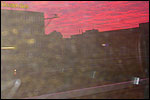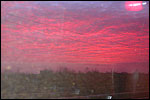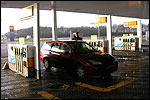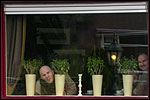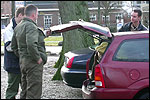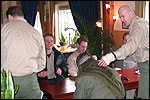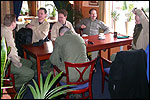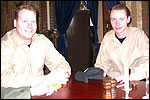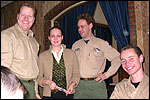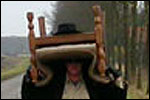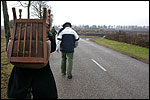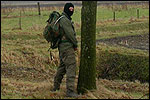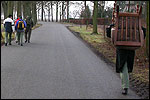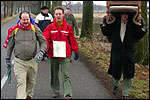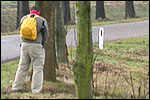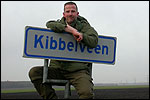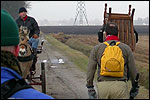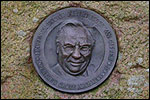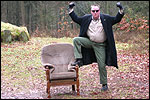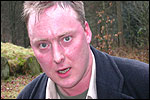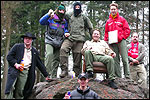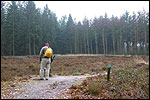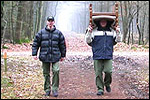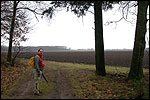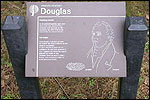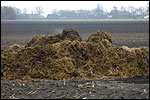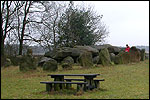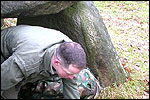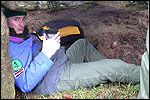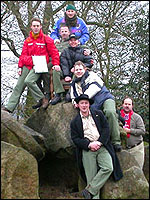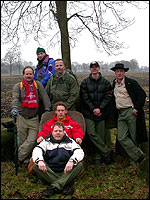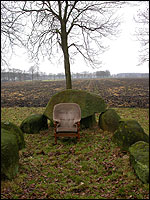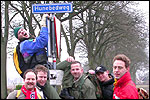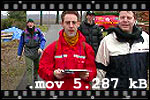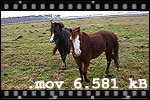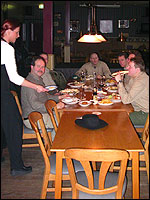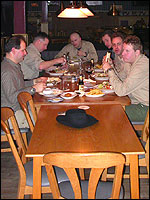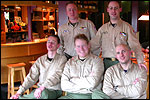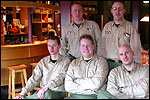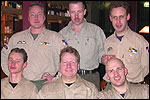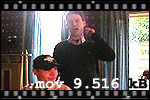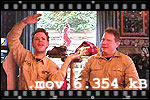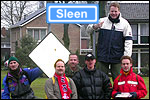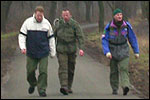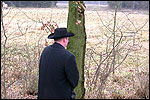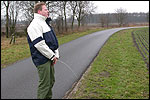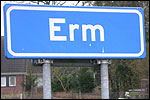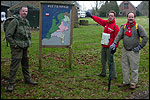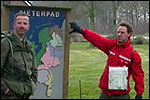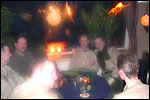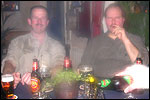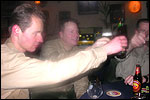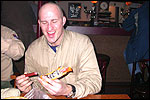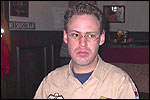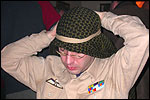| What are we doing?
January 26th, 2003 Across the Netherlands from Top to Toe: Odoorn-Coevorden 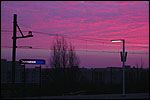 I don't like to give up. Aries never does, particularly not when also Firehorse, in Chinese astrology. And so, when on that cursed day in april of the previous year (Pim and Claus were still alive, hard times were ahead of us) it was decided, after heavy banter, to abandon the oaken armchair on the last dolmen up to that moment, just outside Odoorn, I disagreed. I don't like to give up. Aries never does, particularly not when also Firehorse, in Chinese astrology. And so, when on that cursed day in april of the previous year (Pim and Claus were still alive, hard times were ahead of us) it was decided, after heavy banter, to abandon the oaken armchair on the last dolmen up to that moment, just outside Odoorn, I disagreed.
Thankfully, I wasn't the only one who did, and so Marco van Zijntergen, Larisa and I, on our way back to Haarlem, first returned to that dolmen, to pick up the chair. Which we then hid below the staircase in my home, for the better part of a year. 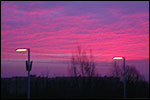 Even van der Schelden MA, a regular disturber of the peace at my domicile after all, did not notice this at all for a long time. Although I do believe that he had latched onto it by the time that I, during the making of the invitations to the Ribbon Shower, and in retribution for grossly despicable ingratitude, blunt opportunism and utmostly insulting behaviour, beat him out of my house and kicked him down those stairs. He returned within a minute, with apologies, but complained about "a broken finger" for months to come. Even van der Schelden MA, a regular disturber of the peace at my domicile after all, did not notice this at all for a long time. Although I do believe that he had latched onto it by the time that I, during the making of the invitations to the Ribbon Shower, and in retribution for grossly despicable ingratitude, blunt opportunism and utmostly insulting behaviour, beat him out of my house and kicked him down those stairs. He returned within a minute, with apologies, but complained about "a broken finger" for months to come.
It did not stop him from collecting that chair on Friday night, with Marco Neumann, from my home. And so, on the following Sunday morning, I could board the train to Utrecht, around seven thirty, with an easy mind. On arrival there, it turned out to inexplicably have incurred a delay (it did, after all, leave Amsterdam on time, after I had changed trains there). It must have been the sunrise. It was so beautiful that it evoked, from the ticket inspector, in passing by, the the lament that she would have loved to have a camera on her, like I did. It's a good thing that Tim Berners-Lee invented the World Wide Web at some time or other, therefore. From the Jaarbeurssquare, then, at great speed, with Neumann, Raymond de Gisser, Albert van Geyningen and an oaken chair, we drove to Drenthe, where in Odoorn it turned out that my mind could not just be easy because of that chair, and that my mind was not the only one that could. Different than myself, namely, Schelden definitely dislikes adventure. As controlfreak who would rather murder suprises than evade them, he arranges days like these in a shipshape way - and yet it always goes awry. But in Odoorn there wasn't a rumour of that: the personnel of the Oringer Marke, our finish in April, expected and welcomed us, with coffee and in the person of the graceful Lydi. Good thing too, that we did not all arrive at once. It gave her a chance to acclimatize. It would have been such a shock, otherwise. Now, this wasn't too bad, and we were satisfied to join Schelden, First Friend of the Wandelsoc. Bert van Prijzen, and Peter 'Panzerfuchs' Weij. 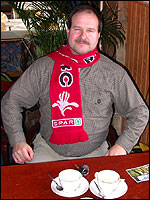 One beautiful photo further, of Bert van Prijzen with a scarf reading SPAR (a division of Bert's employer Laurus that has, by now, been re- and de-structured and reorganized), we left the Oringer Marke, and today's journey began (but not before I had, from the seat of the oaken chair, retrieved the mobile telephone that everyone, grinning in silence, had let me search for for five minutes, when I had thought, just before, that I must have left it on the train. The berloody jokes of these effin ex-commandoes never cease. Fuckers, is what they are! If it isn't a load of empty bottles, appearing in your backpack, it'll be a neatly stamped brick, waiting for you at your local post office!). One beautiful photo further, of Bert van Prijzen with a scarf reading SPAR (a division of Bert's employer Laurus that has, by now, been re- and de-structured and reorganized), we left the Oringer Marke, and today's journey began (but not before I had, from the seat of the oaken chair, retrieved the mobile telephone that everyone, grinning in silence, had let me search for for five minutes, when I had thought, just before, that I must have left it on the train. The berloody jokes of these effin ex-commandoes never cease. Fuckers, is what they are! If it isn't a load of empty bottles, appearing in your backpack, it'll be a neatly stamped brick, waiting for you at your local post office!).
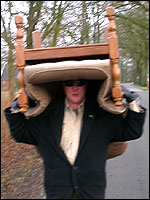 But on the other hand. It did, of course, get me into the right fury, needed to last for seven long kilometres, with an oaken chair on your head. And so we marched through the Drentish landscape, in scenes reminiscent of uh... ...of uh... ...our earlier marches, through the Drentish landscape. This wasn't just our own doing. True, we looked just like last time, as a group stretched out like a ribbon, carrying that chair. But also, the Drentish landscape endlessly repeats itself. Beautiful as it is, it resembles itself terribly so that, time and again, you think "Well I'll be damned, I've been here before!". In blind trust, in our march leader who so often loses his way, now ostensibly resolutely prancing on, the topographic map in claw, we strode on nonetheless, by Sophiaveen, across Boerma's bridge-across-the-Oranje-channel, at a murderous speed that Marco Neumann (who was, after all, completely untrained but for 1 edition of the Airborne, completed in belligerent despair) kept up with, with difficulty, but admirably. But on the other hand. It did, of course, get me into the right fury, needed to last for seven long kilometres, with an oaken chair on your head. And so we marched through the Drentish landscape, in scenes reminiscent of uh... ...of uh... ...our earlier marches, through the Drentish landscape. This wasn't just our own doing. True, we looked just like last time, as a group stretched out like a ribbon, carrying that chair. But also, the Drentish landscape endlessly repeats itself. Beautiful as it is, it resembles itself terribly so that, time and again, you think "Well I'll be damned, I've been here before!". In blind trust, in our march leader who so often loses his way, now ostensibly resolutely prancing on, the topographic map in claw, we strode on nonetheless, by Sophiaveen, across Boerma's bridge-across-the-Oranje-channel, at a murderous speed that Marco Neumann (who was, after all, completely untrained but for 1 edition of the Airborne, completed in belligerent despair) kept up with, with difficulty, but admirably.
Along ugly roads, that got what they deserved from us ('Homo ambulans urinat adversus arborem', or 'the marching man pisses against the tree' - they could learn something from this next to Paradiso Amsterdam, where for years now, on an imitation Parthenon, the text 'Homo sapiens non urinat in ventum', or 'the thinking man does not piss against the wind' is displayed), we now made our way to Kibbelveen (squabble marsh). Looking at it honestly, we're there all the time anyway ('nos iungat querulantia', or 'may quarreling unite us' has after all, for years now, been the motto of the Wandelsoc., given it by Bert van Prijzen and Second Friend of the Wandelsoc. Ted Snodendroom) - so this was reason for a group portrait. That Albert van Geyningen had to molest the municipal sign by climbing on top of it only goes to prove once more the moral deficit that continues to afflict his section of the population (namely that of the ex-commandoes), and which I described above. Well anyway. Once past Kibbelveen, we could soon hang a right, onto the sand trail, past a cart drawn by a Drentish workhorse, and then left into forest De Voshaar. This turned out to be larger than expected, but, huffing and puffing, I did finally bring the chair where it had to be: on the far side of the N376, just past the monument for Drente's Great Archaeologist Albert Egges van Giffen, and atop dolmen D49: the Papeloze Kerk (papist-less church), so named because Menso Alting and other travelling preachers held rebel sermons, at the beginning of hte Reformation. Reason for a pretty picture, of a-mound-of-stones-with-a-dude-in-a-chair-on-top. Having quenched my thirst with Isostar at the Papeloze Kerk, while the rest had expertly decimated the supply of sandwiches, we trailed onward through the forests. While Marco Neumann carried the chair, Bert and I engaged in conversation, about the Celtic Fields we encountered along the way (plots of land from the Iron Age, bordered by low earthen walls, intentionally fortified here for the tourists, that originated from throwing aside roots and boulders unwanted on the field itself), and the Killing Fields of Europe, as described in 'La vita è bella' (a gripping film about an Italian jewish version of van der Schelden MA in barren times of war), which I had seen shortly before, with Larisa. This led us, via the Visigoths, the Romans and the inevitable Asterix and Obelix, to the conclusion that the United States should position themselves as the leader in a long global chain of recolonial protectorates, not meant to exploit, but to further world peace. Satisfied with the consensus reached we left the intellectual part of our conversation to its own resources. Therefore, bullshitting about cars like real men do, we stepped on, past an explanation of the Douglas-fir, beautifully smoking dung and loads of other déjà vus, on to dolmen D50, in Noord-Sleen. We found Weij and van Geyningen sleeping below it. Lazy faggots, them ex-commandoes. Time, therefore, for a pretty picture, of a-mound-of-stones-with-a-dude-in-a-chair-on-top. And of those, we made another one just down the road, after de Gisser had taken over the chair, for a 100 metres, from Neumann. Here, in dolmen D51, we finally left the oaken chair behind, contentedly, a succesful joke completed. 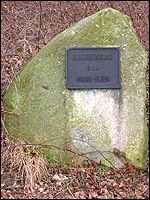 While melancholy and doggedness were therefore now fighting for prevalence inside us, we raised our foot again, over the aptly named Hunebedweg ('dolmen road', but the Dutch word for 'road' also translates into English as 'gone'), away from this last dolmen, and a particularly special piece of the illustrious history of the Societas Ambulationis Academica. We thank the good Mr. van Geyningen profoundly for adding this silliness to our existence. "Next time we'll bring a sofa", was his cheerful comment. We do not consider actually doing anything of the sort, of course - but that much ill-fatedness may follow, this we fervently hope. Marching, after all, is a business tedious enough of itself already. He who deems walking to be a merry pastime, we shall expel from our troubled midst fortwith. While melancholy and doggedness were therefore now fighting for prevalence inside us, we raised our foot again, over the aptly named Hunebedweg ('dolmen road', but the Dutch word for 'road' also translates into English as 'gone'), away from this last dolmen, and a particularly special piece of the illustrious history of the Societas Ambulationis Academica. We thank the good Mr. van Geyningen profoundly for adding this silliness to our existence. "Next time we'll bring a sofa", was his cheerful comment. We do not consider actually doing anything of the sort, of course - but that much ill-fatedness may follow, this we fervently hope. Marching, after all, is a business tedious enough of itself already. He who deems walking to be a merry pastime, we shall expel from our troubled midst fortwith.
Ill-fatedness, by the by, almost immediately arose again. Two unsuspecting quadrupeds, just outside Sleen, were given great fright by de Gisser, following Schelden's feeble-minded caresses, and even a sheep, parked in a pasture across the road, went into a serious fit of sneezing because of this. For richness, I did not know where to turn the lens of my camera first. 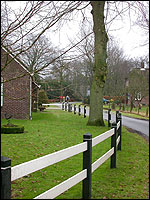 This would go on for a while, for on this, the last picturesque part of today's expedition, Drenthe again whacked us 'round the ears with pastoral beauty. From the magnificent entry road along which we ambled into Sleen to the magnificent church in the village centre, and from the magnificent farm of Farmer Harms to the magnificent body of the sturdy waitress in the excellent Cafeteria De Linde, Bannerschulteweg 17, in which we then used lunch: Sleen is so beautiful that it would do better to stay in books. Or in songs, such as 'Op fietse' ('on bikes') by Skik (from Erica). It, namely, partly concerns a sand trail between Sleen and Erm. Knowing this, Schelden had carefully planned our endeavour in such a manner, that we would walk down this sand trail. And although we had not yet ended up there now, this was also reason for him to terrorize the waitress, and all others present amongst whom ourselves, with a CD brought along for the purpose, and his own rendition of the song, which he sang along to it. This would go on for a while, for on this, the last picturesque part of today's expedition, Drenthe again whacked us 'round the ears with pastoral beauty. From the magnificent entry road along which we ambled into Sleen to the magnificent church in the village centre, and from the magnificent farm of Farmer Harms to the magnificent body of the sturdy waitress in the excellent Cafeteria De Linde, Bannerschulteweg 17, in which we then used lunch: Sleen is so beautiful that it would do better to stay in books. Or in songs, such as 'Op fietse' ('on bikes') by Skik (from Erica). It, namely, partly concerns a sand trail between Sleen and Erm. Knowing this, Schelden had carefully planned our endeavour in such a manner, that we would walk down this sand trail. And although we had not yet ended up there now, this was also reason for him to terrorize the waitress, and all others present amongst whom ourselves, with a CD brought along for the purpose, and his own rendition of the song, which he sang along to it.
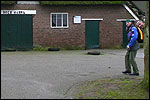 It's a good thing, for the manager, that this made us hungry. And so we plowed into ham and eggs, meat rolls and excellent French bread with gyrosmeat-in-garlicsauce, all flushed away with ample beverage. This is particular to the Wandelsoc.: upon entry, we are shudderingly mistaken for an extreme right assault group, an impression completely annihilated by the time we depart, leaving insane tips behind. "Do come back", is what we invariably hear, even in places utterly shat to bits by Prakke. Yes, even the smile of the wonderful waitress broadened considerably, because of it, here. This was a good thing, because it made her beautiful breasts stand out even more nicely. It's a good thing, for the manager, that this made us hungry. And so we plowed into ham and eggs, meat rolls and excellent French bread with gyrosmeat-in-garlicsauce, all flushed away with ample beverage. This is particular to the Wandelsoc.: upon entry, we are shudderingly mistaken for an extreme right assault group, an impression completely annihilated by the time we depart, leaving insane tips behind. "Do come back", is what we invariably hear, even in places utterly shat to bits by Prakke. Yes, even the smile of the wonderful waitress broadened considerably, because of it, here. This was a good thing, because it made her beautiful breasts stand out even more nicely.
Fighting almost broke out after all though, between Schelden and van Geyningen. For although it is, as yet, unknown how much of the story is true, van Geyningen completely convinced Schelden that he had bought his outfit, which closely resembles the real official HaVeP-Wandelsoc.-dress, especially for the Wandelsoc.. And so intense discussion arose, when he wanted to get into the picture with the rest of the uniformed ones. Consensus was thankfully reached swiftly: Albert has, in this manner, talked himself into a free Wandelsoc.-dress quite cleverly, and we will soon have another Member. Good thing that Bert van Prijzen refuses to become one and persistently remains Friend of the Wandelsoc. - for otherwise we would indeed, as he so aptly puts it, "have no friends". 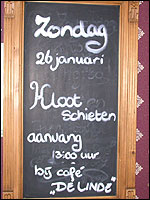 Reasonably satisfied with our bringing this disgusting bullshit to a favourable conclusion, we left our beautiful waitress and, by a sign announcing an upcoming bout of 'klootschieten' (might be a good idea for us, that: I've once done it with close relatives, in this part of the country; it all boils down to throwing a ball and walking after it - great pastime for during that stupid long-distance marching, therefore), Cafeteria De Linde. Thereupon we laid down a brisk pace towards Sleen's village border, where, on Albert's demand, a group portrait was made by the municipal sign. Of his explanation about a shady postal address-construct of one of his female family memebers, which made taking and then showing such a picture to her a merry affair, I understood little, by the way. I hope Albert's happy with it - myself, I failed to be merrified by the event, particularly afterwards. For that edge of Sleen is where, alas, the picturesqueness of this trek squarely ended for the rest of the day.
Reasonably satisfied with our bringing this disgusting bullshit to a favourable conclusion, we left our beautiful waitress and, by a sign announcing an upcoming bout of 'klootschieten' (might be a good idea for us, that: I've once done it with close relatives, in this part of the country; it all boils down to throwing a ball and walking after it - great pastime for during that stupid long-distance marching, therefore), Cafeteria De Linde. Thereupon we laid down a brisk pace towards Sleen's village border, where, on Albert's demand, a group portrait was made by the municipal sign. Of his explanation about a shady postal address-construct of one of his female family memebers, which made taking and then showing such a picture to her a merry affair, I understood little, by the way. I hope Albert's happy with it - myself, I failed to be merrified by the event, particularly afterwards. For that edge of Sleen is where, alas, the picturesqueness of this trek squarely ended for the rest of the day.
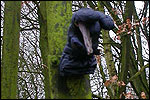 Because even the glove, stuck on a pole atop the fence surrounding the Diphoorn skating rink (which brought back memories for me, of the mannequin's half leg, which I found in the mid eighties, hanging from a steel noose, just around the corner behind the small overpass that separates the, largely immigrant, borough of Battersea from the rest of London - Battersea is the kind of place through which the National Front drives on scooters during the day, to scribble swastikas on walls, but in which it does not dare to set foot at night, because they wouldn't survive it, and that leg was the border marker for one of the locally operating black gangs; I was in Battersea, by the way, to be able to stand inside the cover of Pink Floyd's 'Animals', but all this aside), and that blasted sand trail between Sleen and Erm, which followed shortly after it and was papally kissed by Schelden, can hardly be designated 'picturesque'. Because even the glove, stuck on a pole atop the fence surrounding the Diphoorn skating rink (which brought back memories for me, of the mannequin's half leg, which I found in the mid eighties, hanging from a steel noose, just around the corner behind the small overpass that separates the, largely immigrant, borough of Battersea from the rest of London - Battersea is the kind of place through which the National Front drives on scooters during the day, to scribble swastikas on walls, but in which it does not dare to set foot at night, because they wouldn't survive it, and that leg was the border marker for one of the locally operating black gangs; I was in Battersea, by the way, to be able to stand inside the cover of Pink Floyd's 'Animals', but all this aside), and that blasted sand trail between Sleen and Erm, which followed shortly after it and was papally kissed by Schelden, can hardly be designated 'picturesque'.
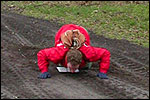 And this while these were without a doubt the two most picturesque things in the entire trajectory yet to follow. Things are bad between Sleen and Erm; they get worse after Erm. Ìn Erm, by the by, we were, to our dismay, confronted with a sign indicating that this was where the Pieterpad runs (it is a popular north-south marching route between Groningen's coastline and Rome). The Pieterpad! Reprehensible domain of the ungodly! Hated halftrajectory of trudging professional marchers! Route for people who like walking! Guck! Guck! Threefold guck! And this while these were without a doubt the two most picturesque things in the entire trajectory yet to follow. Things are bad between Sleen and Erm; they get worse after Erm. Ìn Erm, by the by, we were, to our dismay, confronted with a sign indicating that this was where the Pieterpad runs (it is a popular north-south marching route between Groningen's coastline and Rome). The Pieterpad! Reprehensible domain of the ungodly! Hated halftrajectory of trudging professional marchers! Route for people who like walking! Guck! Guck! Threefold guck!
After that, as said, it got worse. From here on out, this became one of the few real practice marches the Wandelsoc. has undertaken in its existence so far: we namely are, almost always, lucky where the weather is concerned - which is a bad thing. Because it means that you are unprepared for two sudden days of rain in Nijmegen, and they will hit you hard. 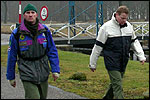 Well, today we could rejoice. From quickly darkening grey skies, a creeping drizzle came down, which slowly drenched us and was paired to a rapid cooling down of the entire environment. This now swiftly made us have a hard time. This effect was, in my case, strengthened by an immoderate urge to defecate, which naturally manifested itself only when we had just left Sleen. A suitable place to solve this problem would not appear until we reached Cafë Cornelis in Dalen. And Cafë Cornelis in Dalen was quite a ways off, yet. Well, today we could rejoice. From quickly darkening grey skies, a creeping drizzle came down, which slowly drenched us and was paired to a rapid cooling down of the entire environment. This now swiftly made us have a hard time. This effect was, in my case, strengthened by an immoderate urge to defecate, which naturally manifested itself only when we had just left Sleen. A suitable place to solve this problem would not appear until we reached Cafë Cornelis in Dalen. And Cafë Cornelis in Dalen was quite a ways off, yet.
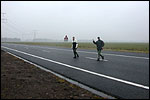 In high spirits because of this hardship, we therefore moved through butt-ugly lowland. Dreary fields, rimmed by brownred polluted ditches, weighed down by grey skies. A forgotten part of Holland, where noone ever goes and of which nobody knows. There aren't even any trains. There are, however, cars. This we found out to our detriment, when it turned out that the path we were following stopped here, somewhere in the middle of nowhere. To the despair of our march leader, whose topographic map failed to indicate the fact. To us, it didn't matter much: dripping with rainwater, we took the awesome fence (Albert insisted it was actually a door unaware it could be opened), and, endangering the lives of passing motorists, crossed the motorway (previously the N37), only very recently put in here, without our consent, two lanes to either side of it. In high spirits because of this hardship, we therefore moved through butt-ugly lowland. Dreary fields, rimmed by brownred polluted ditches, weighed down by grey skies. A forgotten part of Holland, where noone ever goes and of which nobody knows. There aren't even any trains. There are, however, cars. This we found out to our detriment, when it turned out that the path we were following stopped here, somewhere in the middle of nowhere. To the despair of our march leader, whose topographic map failed to indicate the fact. To us, it didn't matter much: dripping with rainwater, we took the awesome fence (Albert insisted it was actually a door unaware it could be opened), and, endangering the lives of passing motorists, crossed the motorway (previously the N37), only very recently put in here, without our consent, two lanes to either side of it.
Moving convulsively now and again, because of the urge, like me, or dejectedly and bent over, like Marco Neumann on this endless, cheerless, dismal stretch, we then finally reached Dalen, and entered the excellent Café-Restaurant Cornelis, quality rest if ever I saw one. And this was a place to never forget again anyway, for Schelden did something unbelievable here: he dug two ginormous cigars from his pocket, and presented them to Bert and Peter. Most uncharacteristic, almost reason to doubt his legendary status of Nescian parasite. It's a good thing we don't fall for that. Some beers and gins later we nonetheless had almost forgotten how evil the outside world could be on this day. That outside world therefore hit us hard again, on the last bit, towards the sanitized city of Coevorden. It is as van Prijzen depicted it and Schelden rehashed it: in Coevoerden they've destructed anything that even remotely resembled beauty, except for the castle, because the costs involved were too high. 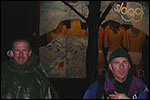 Moving past the Sloggi-billboard-with-the-beautiful-buttocks, the nastiness increased swiftly. In nightly rain, splattering hissing onto the asphalt shortly lit by passing headlights, Neumann cursed Schelden. "Coevorden is to your right, you moron!" - but Schelden marched on, his topographic map for guide. And it must be said, it was quite correct. Through the borough of Lootuinen, and by the monument for van Heutsz, the Butcher of Atjeh, where a group portrait, significantly, failed due to lack of light, we marched onto the market square of Coevorden, and into the Café Candia. Moving past the Sloggi-billboard-with-the-beautiful-buttocks, the nastiness increased swiftly. In nightly rain, splattering hissing onto the asphalt shortly lit by passing headlights, Neumann cursed Schelden. "Coevorden is to your right, you moron!" - but Schelden marched on, his topographic map for guide. And it must be said, it was quite correct. Through the borough of Lootuinen, and by the monument for van Heutsz, the Butcher of Atjeh, where a group portrait, significantly, failed due to lack of light, we marched onto the market square of Coevorden, and into the Café Candia.
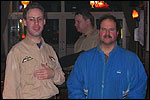 Ugly as Coevorden may be, the Café Candia is an ex-cel-lent establishment, with a broadhearted, beautifully mustachioed landlord, and an animating patronage. There was, for instance, the blonde tart who, for sheer lewdness, almost sagged over her barstool - a fact lecherously noted by both Albert and Peter. Peter muttered things about fluids dripping from eyebrows that I shall not repeat here. Good fun therefore, and the quadruples tasted excellently too. Add to that the fact that the company surrounding the harlot won a debaucherous game of off-key singing from Schelden, and there really is no reason why Schelden, in reply to Weij's happy consumption of a BIFI-sausage, should suddenly have converted to the islam. Ugly as Coevorden may be, the Café Candia is an ex-cel-lent establishment, with a broadhearted, beautifully mustachioed landlord, and an animating patronage. There was, for instance, the blonde tart who, for sheer lewdness, almost sagged over her barstool - a fact lecherously noted by both Albert and Peter. Peter muttered things about fluids dripping from eyebrows that I shall not repeat here. Good fun therefore, and the quadruples tasted excellently too. Add to that the fact that the company surrounding the harlot won a debaucherous game of off-key singing from Schelden, and there really is no reason why Schelden, in reply to Weij's happy consumption of a BIFI-sausage, should suddenly have converted to the islam.
He did do this, strangely enough, by wrapping the shawl that Peter Weij had brought along to "maintain a bit of that Gretta-feeling", around his ears. And so, a beautiful day ended beautifully. To your health gentlemen, excellent walking there. Aken awaits. |
